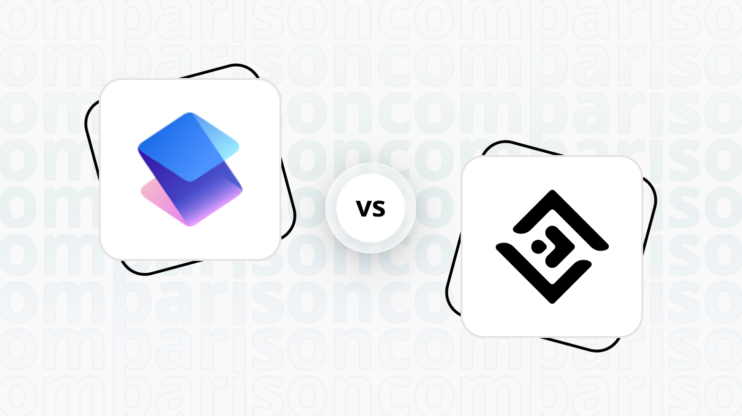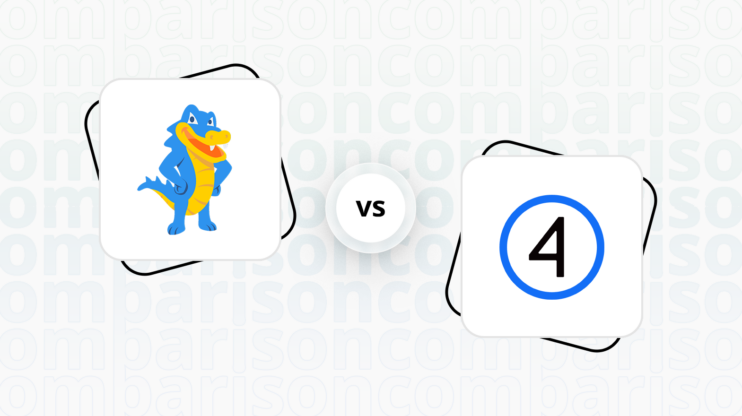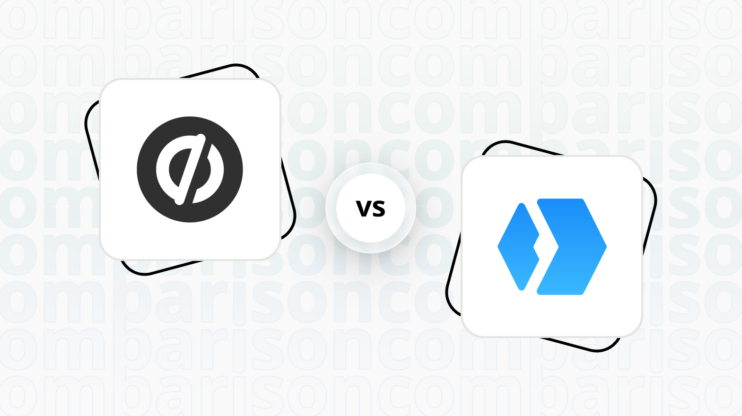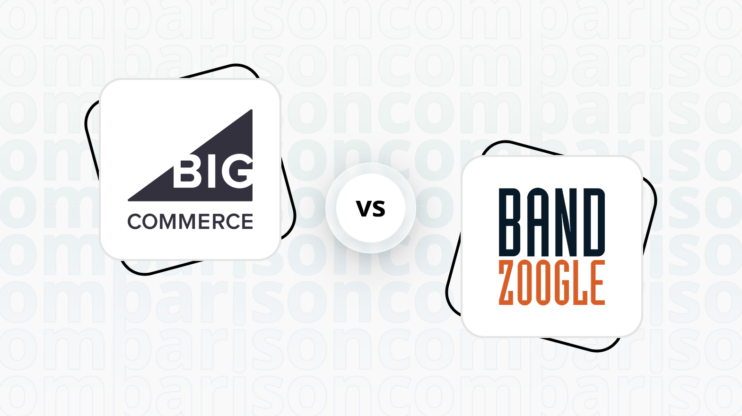iPage vs Instapage: Final verdict
iPage and Instapage both offer unique features tailored to different user needs, but they cater to distinct audiences.
-
iPage (Overall Grade: 6.1/10)
is a user-friendly web hosting and site builder platform, ideal for small businesses and personal projects. It offers comprehensive services including hosting, domain registration, and e-commerce solutions. However, it lacks some advanced design features and integrations found in more robust platforms. When comparing iPage vs Instapage, iPage is suitable for users looking for an all-in-one solution with basic ecommerce capabilities and affordable hosting options. -
Instapage (Overall Grade: 6.6/10)
excels in creating high-converting landing pages with its intuitive drag-and-drop editor and extensive customization options. It offers advanced marketing tools, AI content generation, and seamless integrations, making it perfect for businesses focused on advertising conversion and lead generation. Considering iPage vs Instapage, Instapage is the preferred choice for users who prioritize ease of use, design flexibility, and marketing optimization.

|

|
|
|---|---|---|
|
Design functionalities & templates |
7.0 |
8.0 |
|
Ease of use |
7.6 |
8.5 |
|
Ecommerce |
5.7 |
4.2 |
|
Website Editors |
6.8 |
7.5 |
|
Product testing options |
2.5 |
6.1 |
|
Price |
7.3 |
7.0 |
|
Hosting quality |
7.7 |
6.0 |
|
Website speed optimization |
7.4 |
6.2 |
|
Plugins and integrations |
6.3 |
6.8 |
|
Marketing features |
7.2 |
7.7 |
|
Customer support |
6.9 |
7.6 |
|
Security |
7.5 |
8.4 |
|
AI capabilities |
3.0 |
6.0 |
|
User Management |
3.2 |
7.3 |
Which one is the best for ecommerce: iPage or Instapage?
 5.7
5.7
 4.2
4.2
Verdict
: iPage is better suited for small to medium-sized businesses looking to establish an online store, while Instapage excels in landing page optimization with some ecommerce integrations.
-
iPage
: iPage provides a range of ecommerce features, including inventory management, coupon codes, SEO tools, and PayPal integration. It is designed to cater to small businesses and personal projects, offering a user-friendly interface and comprehensive services. However, it may lack advanced customization and integration options compared to specialized ecommerce platforms. -
Instapage
: Instapage focuses on creating high-converting landing pages with tools for personalization, optimization, and testing. While it supports integration with ecommerce platforms like Shopify and payment gateways such as Stripe and PayPal, it does not offer dedicated ecommerce templates or extensive product page customization. Instapage is ideal for businesses looking to enhance their advertising conversion through optimized landing pages.
Which one is the best for informational and business websites?
 7.2
7.2
 7.9
7.9
Verdict
: When it comes to creating informational business websites, Instapage takes the lead with its advanced design functionalities and ease of use, making it a more suitable choice for businesses focused on marketing and conversions. iPage, while user-friendly and affordable, is better suited for small businesses and personal projects.
-
iPage
: iPage offers a user-friendly web hosting and site builder platform with a variety of templates and a drag-and-drop builder. It is ideal for small businesses and personal projects, providing comprehensive services including hosting, domain registration, and e-commerce solutions. However, its design functionalities and mobile responsiveness require manual adjustments, making it less optimal for more complex informational websites. -
Instapage
: Instapage excels in creating high-performing landing pages with its intuitive drag-and-drop interface and extensive customization options. It offers a range of tools for personalization, optimization, and testing, making it ideal for businesses focused on increasing sales and leads. With a higher score in design functionalities and ease of use, Instapage is the preferred choice for creating visually appealing and effective informational business websites.
iPage vs Instapage: Detailed comparison
Design functionalities & templates
Design FunctionalitiesRepresents how well each platform allows for creative design and customization of websites.Score Components:
- Template Variety (30%): Range and quality of design templates.
- Customization (30%): Flexibility and options for design alterations.
- User Interface (20%): Ease and intuitiveness of the design process.
- Responsiveness (10%): Adaptability to different devices and screen sizes.
- Innovation (10%): Unique design features and tools.
 7.0
7.0
 8.0
8.0
Winner: Instapage.
With a higher score in design functionalities and templates, Instapage offers more extensive customization options, mobile-responsive templates, and creative design possibilities.
iPage offers a wide variety of templates and designs, catering to users with diverse needs and preferences. However, its mobile responsiveness often requires manual adjustments to ensure optimal display on mobile devices. While iPage’s website builder is user-friendly, it lacks some advanced design features and integrations found in more robust platforms.
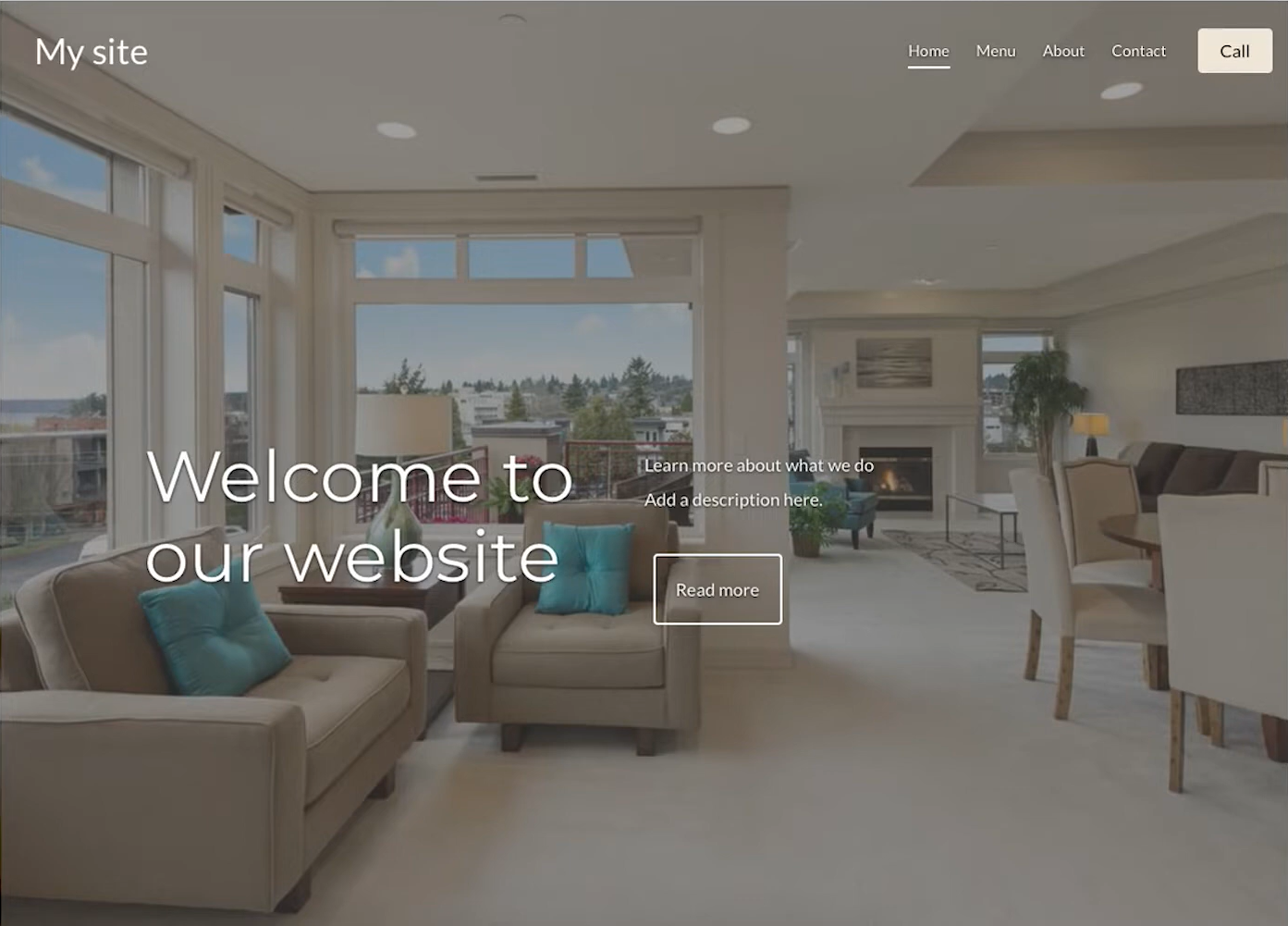
On the other hand, Instapage provides an extensive collection of 100+ design templates for website building, business-specific templates. These templates are tailored to support small teams and businesses in executing their marketing campaigns efficiently. Instapage’s website builder offers extensive customization options through its drag-and-drop editor, allowing for detailed control over layout, design, and content.
Get a head start on website creation with AI
Create a custom website tailored to your business needs 10X faster with 10Web AI Website Builder!
Ease of use
Ease of useReflects the platform’s overall user-friendliness.Score
Components:
- Learning curve (40%): Quickness and ease of getting started.
- Interface design (30%): Simplicity and intuitiveness of layout.
- User guidance (20%): Quality of tutorials and support.
- Flexibility (10%): Adaptability to various user skills.
 7.6
7.6
 8.5
8.5
🏆 Winner: Instapage
. Scoring 8.5, Instapage offers an intuitive drag-and-drop interface and a wide range of customization options, making it easier for users to create and manage their landing pages. iPage, with a score of 7.6, also provides a user-friendly experience but with somewhat limited design options compared to more advanced website builders. If ease of use is a priority, Instapage is the clear winner in this category.
Learning Resources
🏆 Winner: Instapage
. Both platforms offer comprehensive learning resources, but Instapage’s resources are more user-friendly and focused on education and support, providing a high-quality user experience.
For ecommerce
EcommerceMeasures the platform’s effectiveness in supporting online business activities.Score Components:
- Ecommerce themes and templates (20%): Variety and design of templates.
- Product management (25%): Ease of managing and organizing products.
- Payment options (25%): Variety and convenience of payment methods.
- Ecommerce features (20%): Features for managing an ecommerce store.
- Integration (10%): Compatibility with external e-commerce tools and services.
 5.7
5.7
 4.2
4.2
iPage and Instapage offer different ecommerce capabilities, with iPage providing a more comprehensive set of features for small to medium-sized businesses looking to establish an online store. On the other hand, Instapage, primarily a landing page builder, supports integration with ecommerce platforms such as Shopify.

|

|
|
|---|---|---|
|
Ecommerce themes and templates |
5.5 |
0.0 |
|
Product page customization |
5.0 |
0.0 |
|
Payment processing and commissions |
6.0 |
5.0 |
|
POS capabilities |
3.0 |
0.0 |
|
Payment gateways |
6.5 |
6.0 |
|
Product numbers |
4.0 |
0.0 |
|
Additional ecommerce features |
5.5 |
4.0 |
iPage ecommerce features:
- Inventory Management and Tracking
- Coupon Codes and Promotions
- SEO Tools
- PayPal Integration
Instapage ecommerce features:
- Shopify integration
- Payment gateways such as Stripe and Paypal
Ecommerce themes & templates
iPage offers a variety of ecommerce-specific templates designed to cater to online stores and businesses. These templates are integrated with features such as shopping carts, product catalogs, and payment processing options to facilitate online transactions. However, the exact number of ecommerce templates available can vary, and users might find some limitations in terms of customization and advanced ecommerce functionalities compared to specialized ecommerce platforms. On the other hand, Instapage does not have ecommerce specific templates.
Product page customization
iPage’s website builder offers a range of ecommerce product page customization options, allowing users to design their storefronts with various templates, adjust layouts, and incorporate multimedia elements like images and videos to showcase products. Users can also edit product descriptions, manage inventory, and set up different payment options. However, limitations may include less flexibility in advanced customization or coding for those who require unique, highly tailored functionalities beyond the provided templates and settings. Additionally, compared to specialized ecommerce platforms, iPage might offer fewer integrations with external tools and apps. Instapage, on the other hand, does not have product page customization capabilities.
Payment processing
When it comes to payment processing, iPage supports several payment options for eCommerce, including major gateways like PayPal, Stripe, and others, catering to a wide range of currencies and countries. iPage does not charge commissions for transactions, commissions are charged by the gateways themselves. While iPage offers flexibility in online payment processing, it does not explicitly mention integrated POS capabilities for in-person transactions. For billing and subscription payments, iPage accepts credit cards, PayPal, and check or money order, offering diverse payment methods for its users.
Instapage supports payment gateway integration, notably through external systems and third-party services like Commence Payments for Stripe, facilitating various payment options such as Apple Pay, Google Pay, and card payments. The platform itself does not directly charge commissions for transactions, but payment gateways may have their own fees. While Instapage specializes in creating high-converting landing pages with a focus on online marketing, it does not explicitly offer Point of Sale (POS) capabilities, suggesting a primary use case away from direct sales or retail transactions.
Website Editors
Website EditorsEvaluates the platforms’ website building and editing capabilities.Score Components:
- Customization tools (40%): Range and power of editing features.
- Editor usability (30%): User experience within the editor.
- Design flexibility (20%): Freedom in layout and design changes.
- Update and maintenance ease (10%): Simplicity of updating and maintaining the site.
 6.8
6.8
 7.5
7.5
🏆
Winner: Instapage
. With a score of 7.5, Instapage offers a comprehensive website builder focused on creating and optimizing landing pages for various marketing campaigns. It offers a drag-and-drop editor, AI content generation, detailed analytics, and extensive customization through custom code editing, alongside security and compliance features. The platform supports collaboration, integrates with numerous marketing tools, and is designed to streamline the process of building, testing, and optimizing landing pages to increase conversions.
iPage, scoring 6.8, offers a user-friendly website builder editor designed for ease of use, catering to both beginners and those with some web design experience. It offers a drag-and-drop interface, allowing users to easily add, remove, and customize elements on their web pages without needing to code. Users can choose from a variety of templates that are responsive and customizable to fit their brand or personal style. Additionally, the editor includes features for adding social media links, integrating e-commerce functionalities, and optimizing for search engines, making it a versatile tool for creating a wide range of websites.
Mobile editor/app
 5.0
5.0
 0
0
🏆
Winner: iPage
. Both iPage and Instapage do not have dedicated mobile editor apps. However, iPage allows users to edit their websites on a mobile browser, albeit with some limitations. This feature provides users with the flexibility to make changes to their websites on the go. On the other hand, Instapage does not provide any mobile editing capabilities, which can be a significant drawback for users who prefer to manage their websites from their mobile devices. Therefore, iPage is the winner in this category.
Product testing options
Product Testing OptionsAssesses the options for trying out platform features before commitment.Score Components:
- Trial quality (40%): Extent and usefulness of the trial or free version.
- Feature accessibility (30%): How many features are available to test.
- Trial duration (20%): Length of the trial period.
- Ease of transition (10%): Smoothness of moving from trial to paid plans.
 2.5
2.5
 6.1
6.1
Overall Result
:
Instapage Wins
. Instapage scores 6.1 in product testing options, significantly higher than iPage’s 2.5. While both platforms do not offer a free version, Instapage provides a 14-day free trial, allowing users to test its premium features. iPage, on the other hand, does not offer a free trial but allows testing of all features during a 30-day refundable period.

|

|
|
|---|---|---|
|
Free Plan |
No | No |
|
Trial Duration |
No free trial |
14 days |
|
Testing Premium Features |
During 30-day refundable period |
During the free trial |
|
Money Back Guarantee |
30-day money back guarantee |
24-hour money back guarantee |
Price
PriceLooks at the cost-effectiveness and value for money of each platform.Score Components:
- Plan value (40%): What each pricing tier offers.
- Transparency and clarity (30%): Clearness of pricing structures.
- Flexibility of plans (20%): Range of options to suit different budgets.
- Hidden costs (10%): Additional expenses not included in the plan.
 7.3
7.3
 7.0
7.0
iPage offers a range of plans with different features and prices, and offers up to 80% discount for annual subscriptions. Instapage, on the other hand, offers a Build plan and a customized Convert plan, with a 20% discount on annual billing. The Convert plan is a premium, enterprise-level solution with personalized services.

|

|
|
|---|---|---|
|
$10-$20 |
Basic ($15.99/month): Simple website or blog, 1 website, 10 GB SSD, free domain, managed WordPress, free SSL for 1st year. Value for price: 6.5 |
No offering at this amount. |
|
$20-$30 |
Choice Plus ($27.99/month): Multiple sites with storage, security, backups, 3 websites, 40 GB SSD, daily backups, domain privacy, malware scanning. Value for price: 7.5 |
No offering at this amount. |
|
$30-$34 |
Online Store ($32.99/month): Online selling with eCommerce tools, 3 websites, 40 GB SSD, store features like unlimited products and secure payments. Value for price: 8.0 |
No offering at this amount. |
|
$34-$40 |
Pro ($34.99/month): High traffic sites, advanced storage, 5 websites, 100 GB SSD, optimized for high traffic, enhanced security and backups. Value for price: 9.0 |
No offering at this amount. |
|
$200+ |
No offering at this amount. |
BUILD ($299/month): Optimize conversions with experimentation and lead generation. Includes #1 Landing page builder, No Conversion Limits, Server-Side A/B Testing, AI Content, Unlimited Triggered Popups, Thor Render Engine, Dynamic Text Replacement, SSL Encryption, GDPR Compliance, Google SSO, Zapier, HubSpot, Salesforce, Marketo Integration, Multi-Step Forms, Invisible reCAPTCHA, and more. Value for Price: 7.5 |
location. As a result in rare cases the prices displayed here can differ from the ones you see on their
websites.
Hosting quality
Hosting
qualityExamines the reliability and performance of the hosting solutions.Score Components:
- Uptime (40%): Consistency and reliability of website availability.
- Speed (30%): Loading times and performance.
- Bandwidth and storage (20%): Sufficiency of resources provided.
- Data centers (10%): Quality and distribution of hosting infrastructure.
 7.7
7.7
 6.0
6.0
🏆
Winner: iPage
iPage offers a range of affordable hosting services including shared, WordPress, and VPS hosting, with unlimited storage and bandwidth. However, its performance speed and scalability features may not meet the expectations of all users. On the other hand, Instapage offers cloud hosting but does not disclose the locations of its data centers. Both platforms have an uptime of 99.9%, but only Instapage offers an uptime guarantee. Based on these factors, iPage has a higher Hosting Quality score of 7.7 compared to Instapage’s score of 6.0.

|

|
|
|---|---|---|
|
Do they offer hosting? |
Yes |
Yes |
|
Data Centers: |
2 data centers: US, Europe |
Not disclosed |
|
Type of hosting: |
Managed WordPress Hosting |
Cloud Hosting |
|
Uptime: |
99.9% |
99.9% |
|
Uptime Guarantee: |
No |
Yes, 99.9% |
Website Speed Optimization
Website Speed OptimizationEvaluates optimization of website loading timesScore Components:
- PageSpeed Score (30%): Google’s score indicating performance optimization.
- Loading Time (30%): The average time until a website is fully interactive.
- Mobile Optimization (15%): Optimization effectiveness for mobile devices.
- Resource Optimization (15%): Optimizing images, scripts, and other heavy resources.
- CDN Usage (10%): Use of CDN to enhance speed across geolocations.
 7.4
7.4
 6.2
6.2
🏆 Winner: iPage
Both iPage and Instapage prioritize website performance and page speed, but iPage outperforms Instapage in terms of website speed optimization.

|

|
|
|---|---|---|
|
Focus |
Web Server optimizations, Caching, CDN, Database optimization, SEO optimization |
Responsive design, Image optimization, Caching |
|
Performance Tools |
Google Lighthouse, PageSpeed Insights |
Google PageSpeed Insights Integration |
|
Key Strategies |
Web Server optimizations, Caching, CDN, Database optimization, SEO optimization |
Responsive design, Image optimization, Caching |
|
Load Times |
2.6s average |
Varies depending on optimization |
|
Page Speed Scores Range |
72/100 average |
Varies depending on optimization |
|
Core Web Vitals Improvement |
LCP, FID, CLS improvements |
No information provided |
iPage, a user-friendly web hosting and site builder platform, offers comprehensive services including hosting, domain registration, and e-commerce solutions. iPage’s approach to enhancing site speed includes web server optimizations, caching, CDN, database optimization, and SEO optimization. This approach leverages iPage’s fast servers and CDN network to boost load speed. iPage also focuses on improving Core Web Vitals (CWV) scores, with an emphasis on LCP, FID, and CLS improvements. The average load time for iPage is 2.6 seconds, with an average PageSpeed score of 72/100.
On the other hand, Instapage, a comprehensive landing page platform, focuses on improving advertising conversion through personalization, optimization, and testing. Instapage’s strategies for speed optimization include responsive design, image optimization, and caching. However, Instapage does not provide any information on their Core Web Vitals improvements. The load times and PageSpeed scores for Instapage vary depending on optimization.
Get a head start on website creation with AI
Create a custom website tailored to your business needs 10X faster with 10Web AI Website Builder!
Plugins and integrations
Plugins and integrationsMeasures the range and effectiveness of additional plugins and integrations.Score Components:
- Variety of options (40%): Range of available add-ons.
- Integration smoothness (30%): Ease of integrating plugins into the site.
- Quality of plugins (20%): Functionality and reliability of the options.
- Custom integration capabilities (10%): Support for custom or third-party integrations.
 6.3
6.3
 6.8
6.8
🏆 Winner: Instapage.
With a score of 6.8, Instapage edges out iPage (6.3) in the plugins and integrations category. Instapage supports over 40 integrations with third-party platforms, including major CRM, email marketing, analytics, and advertising tools. This enables users to connect their landing pages seamlessly with essential digital marketing tools and services, enhancing the overall marketing funnel. On the other hand, iPage offers a variety of plugins and extensions, with options ranging from SEO tools to security enhancements. However, the breadth and depth of Instapage’s integrations give it the upper hand.
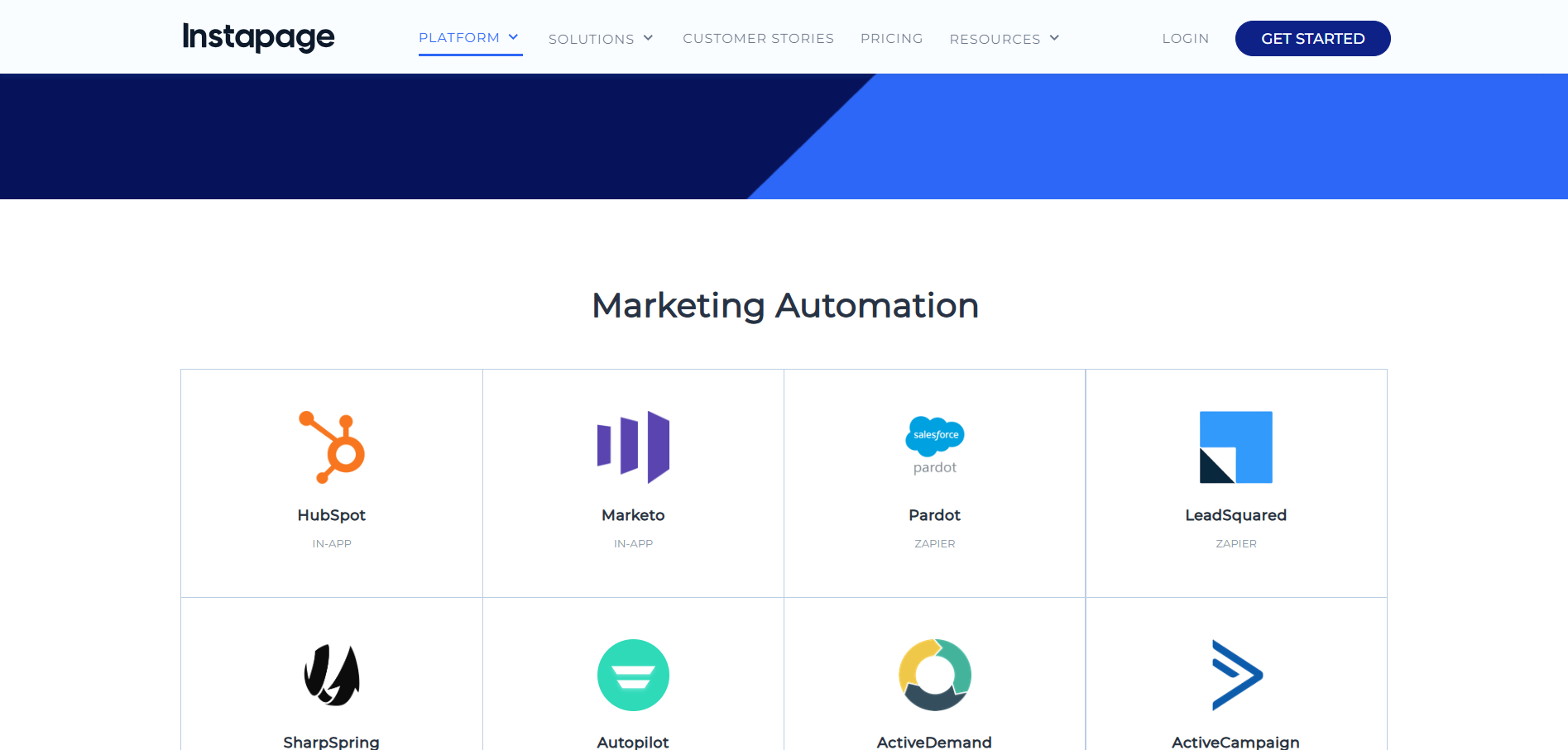
Marketing Features
Design FunctionalitiesRepresents how well each platform allows for creative design and customization of websites.Score Components:
- Template Variety (30%): Range and quality of design templates.
- Customization (30%): Flexibility and options for design alterations.
- User Interface (20%): Ease and intuitiveness of the design process.
- Responsiveness (10%): Adaptability to different devices and screen sizes.
- Innovation (10%): Unique design features and tools.
 7.2
7.2
 7.7
7.7
🏆
Overall Winner: Instapage
. Instapage stands out for its comprehensive landing page platform designed to improve advertising conversion. iPage, on the other hand, offers a more general set of marketing tools suitable for small businesses and personal projects.

|

|
|
|---|---|---|
|
SEO Tools |
|
|
|
Email Marketing |
|
|
|
Blogging |
|
|
|
Social Media Integration |
Integrated social media buttons and features |
Advanced integration for ad-to-page personalization |
|
Analytics and Reporting |
Option to integrate Google Analytics |
Conversion analytics, real-time reports, and A/B testing |
|
Ads and Promotions |
Offers SEO, social media integration, email marketing |
AdMap for ad-to-page personalization and integration with advertising platforms |
Customer Support
Customer supportEvaluates the quality and availability of support options.Score Components:
- Response time (40%): Speed of support responses.
- Support quality (30%): Effectiveness and helpfulness of the support.
- Availability (20%): Range of support channels (phone, chat, email).
- Resource richness (10%): Quality of self-help and educational materials.
 6.9
6.9
 7.6
7.6
🏆 Winner: Instapage
. When comparing iPage vs Instapage, Instapage takes the lead in customer support with a score of 7.6. Instapage offers live chat support within the application from Monday to Friday, 24 hours a day, and provides additional technical support via email and phone during business hours. This ensures users have multiple channels to seek help and maintain a written record of their service requests.
iPage, with a customer support score of 6.9, provides 24/7 support through phone, email, and live chat, ensuring that customers can receive assistance at any time. However, it lacks the specialized enterprise support that Instapage offers, such as personalized assistance from Success Managers and Launch Specialists, which can be crucial for businesses looking to optimize their conversion rates and maximize ROI.
Security
SecurityLooks at the platforms’ security measures and data protection.Score Components:
- Data protection (40%): Safeguards for user and customer data.
- SSL and encryption (30%): Implementation of secure connections.
- Compliance (20%): Adherence to industry security standards.
- Regular updates (10%): Frequency of security updates and patches.
 7.5
7.5
 8.4
8.4
🏆
Winner: Instapage
. Instapage has a higher security score and offers a comprehensive set of security measures, including SOC 2 Type I and Type II compliance, risk management policies, and a strong focus on privacy, aligning with GDPR and CCPA regulations. Their Information Security Program is based on ISO 27001/2 and NIST 800-53 frameworks, covering multiple aspects of security from asset management to incident response. Physical, access, and network security protocols are rigorously enforced, alongside SSL/HTTPS support for all landing pages to ensure secure client data handling and privacy.
iPage also offers a range of security measures, including Domain Privacy Protection and SiteLock, a comprehensive security suite designed to protect websites from malware, spam, and hackers. However, it has a lower security score compared to Instapage.
AI Capabilities
AI capabilitiesMeasures the effectiveness of AI-driven features and tools.Score Components:
- Automation efficiency (40%): Impact of AI on streamlining processes.
- Personalization (30%): AI-driven customization for users or customers.
- AI-Assisted design (20%): Role of AI in website design and functionality.
- Data analysis (10%): Use of AI in interpreting user data and analytics.
 3.0
3.0
 6.0
6.0

|

|
|
|---|---|---|
|
AI Builder |
iPage offers an AI-powered website builder |
|
|
AI Ecommerce features |
|
|
|
AI Content Generation |
|
Instapage offers an AI Content Generator |
|
Additional AI features |
iPage’s AI features assist in efficient website setup |
Instapage offers AI Experiments for dynamic traffic allocation |
🏆 Winner: Instapage
. Despite not having an AI builder, Instapage scores higher in AI capabilities due to its AI Content Generator and AI Experiments. These features facilitate quicker landing page creation and efficient traffic allocation, providing a more sophisticated AI experience compared to iPage.
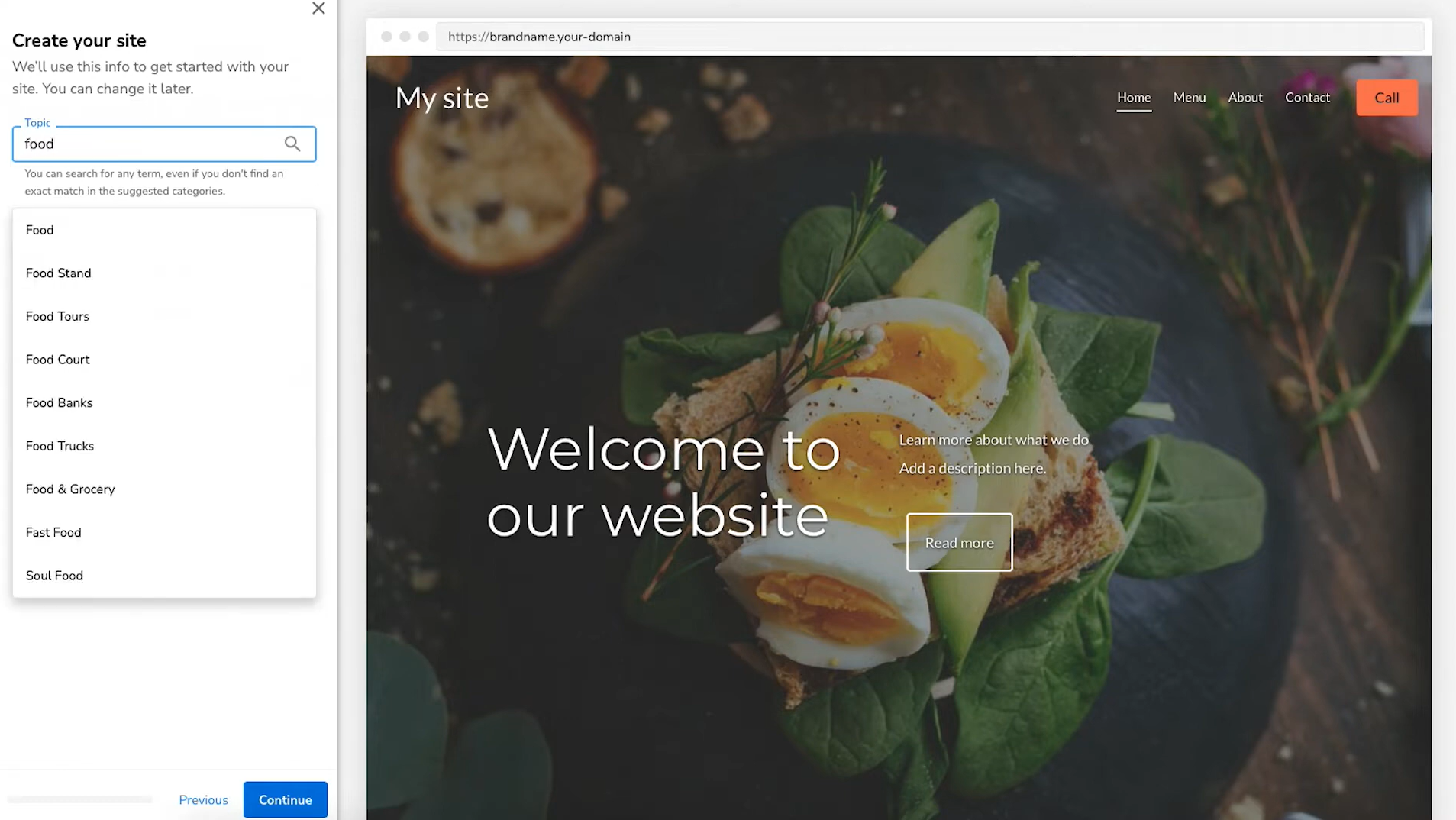
User Management
User ManagementAssesses the platforms’ capabilities in managing user roles, permissions, and accessibility.Score Components:
- Role Customization (40%): Flexibility in creating and defining user roles and
permissions. - Ease of Management (30%): User interface and tools for managing users.
- Access Control (20%): Effectiveness of access control measures for different user
levels. - Scalability (10%): Ability to manage a growing number of users efficiently.
 3.2
3.2
 7.3
7.3
🏆 Winner: Instapage
. The user management capabilities of iPage and Instapage are quite different.
- iPage’s website builder offers very limited multi-user functionality and access levels compared to more sophisticated website builder platforms.
- On Instapage, users managing a website can be assigned different roles: Viewer, Editor, or Manager. A Viewer has limited access, only able to view pages. An Editor can edit pages, and a Manager has full access except for billing information and the audit log. The number of users you can invite depends on your subscription limits. However, only one user can edit a page at a time to prevent overwrite issues.
Instapage User Roles and Access Levels:
| Role | Description | Access Highlights |
|---|---|---|
| Administrator | Oversees the entire Instapage account, managing users, settings, and billing information. | Full access to all features, including user management, settings, billing, and page creation and editing. |
| Editor | Works on creating and editing landing pages, responsible for the design and content. | Can create and edit pages, manage integrations, and view analytics, but cannot change account settings or manage users. |
| Viewer | Has view-only access to the landing pages, typically for review or analytics purposes. | Can view pages and analytics but cannot make any edits or access account settings. |
Additional Features

|

|
|
|---|---|---|
|
SSL Certificate |
|
|
|
Custom Domain |
|
|
|
Free Custom Domain Included |
|
|
|
International Domains |
|
|
|
Mobile Responsive |
|
|
|
Page Speed |
|
|
|
Website Builder Mobile App |
|
|
|
Convert a Website To An App |
|
|
|
Website Analytics |
|
|
|
Multilingual Sites |
|
|
|
Multiple Users |
|
|
iPage vs Instapage: User Feedback
Instapage is well-regarded for its user-friendly interface, robust customer support, and seamless integration capabilities. Users highlight its effectiveness in creating high-quality, high-converting landing pages optimized for lead capture. The platform’s ease of use is a significant advantage, allowing both experienced marketers and newcomers to quickly design and deploy landing pages. However, some users have reported challenges with mobile responsiveness, custom domain settings, and occasional bugs.
In contrast, iPage, while not available on G2, is known for its user-friendly web hosting and site builder platform. It offers templates and a drag-and-drop builder to simplify website creation for those without technical expertise. iPage targets small businesses and personal projects, providing comprehensive services including hosting, domain registration, and e-commerce solutions. The recent partnership with Bluehost aims to enhance their hosting capabilities and pricing plans.
The making of this blog
We followed a clear, step-by-step process to write and research this article.
iPage vs Instapage: FAQ
Which platform is better for ecommerce, iPage or Instapage?
Can I use Instapage for creating informational business websites?
How do iPage and Instapage compare in terms of design functionalities and templates?
Which platform offers better ease of use?
What are the main differences in website editors between iPage and Instapage?
How do iPage and Instapage fare in product testing options?
Which platform is more affordable?
Which platform has better hosting quality?
In terms of website speed optimization, which platform performs better?
Which platform offers better plugins and integrations?
How do iPage and Instapage compare in marketing features?
Which platform provides better customer support?
Regarding security, which platform is more secure?










